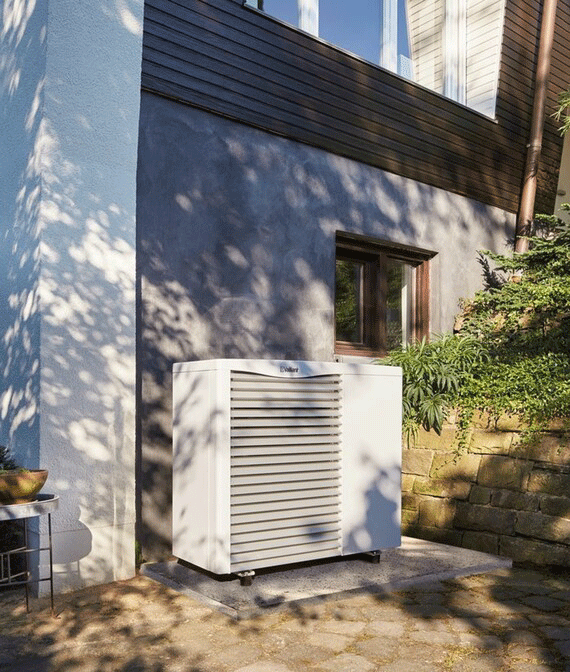Heat Pumps
We offer air source heat pumps, average costs range from £8,000 (inc VAT) to £16,000 (inc VAT)
Heat pumps work using a similar technology to your refrigerator, but in reverse, they use electricity to run. Their primary function is heating through radiators/underfloor heating systems for your home or business. Most have climate control capabilities and some can be used for cooling by reversing the process.
Heat pumps come in three general types; Water Source, Ground Source and Air Source, each differ in where the heat is extracted from. There are also a number of different delivery mechanisms for heat pumps; air-to-water, air-to-air, water-to-water and water-to-air.

We currently offer air source heat pumps from Vaillant. These work by transferring heat from the air flowing through them with a fan, compressing it to a higher temperature and then passing it through a heat exchanger; this is used to heat water for your central heating system or hot water cylinder.
Air source are not the most efficient form of heat pump, however they are the easiest to install and can be used in a wider range of properties as there is no need for a large outdoor space, you only need enough space for the unit and some free space around it for the fan to have enough free air flow available. The size and number of units required will depend on the property size and heating requirements.
The efficiency of an air source heat pump will vary depending on the air temperatures around it; on colder days it won't be as efficient, however they can still product heat at temperatures below 0 celsius. The units can also product more noise than their ground or water source alternatives, although often the noise of the fan cannot be heard inside.
Click Here to Arrange a free home surveyMain advantages: lower running costs, less maintenance, safer than combustion-based systems, reduce your CO2 emissions, some can provide cooling in summer, long life span/extremely reliable and boiler upgrade scheme grants available.
Main disadvantages: high upfront costs, fairly lengthy installation time, questionable sustainability of some heat pumps refrigerants, significant work to house may be required, cold weather can damage the system, not entirely carbon neutral/electricity required and can require special planning permissions.

